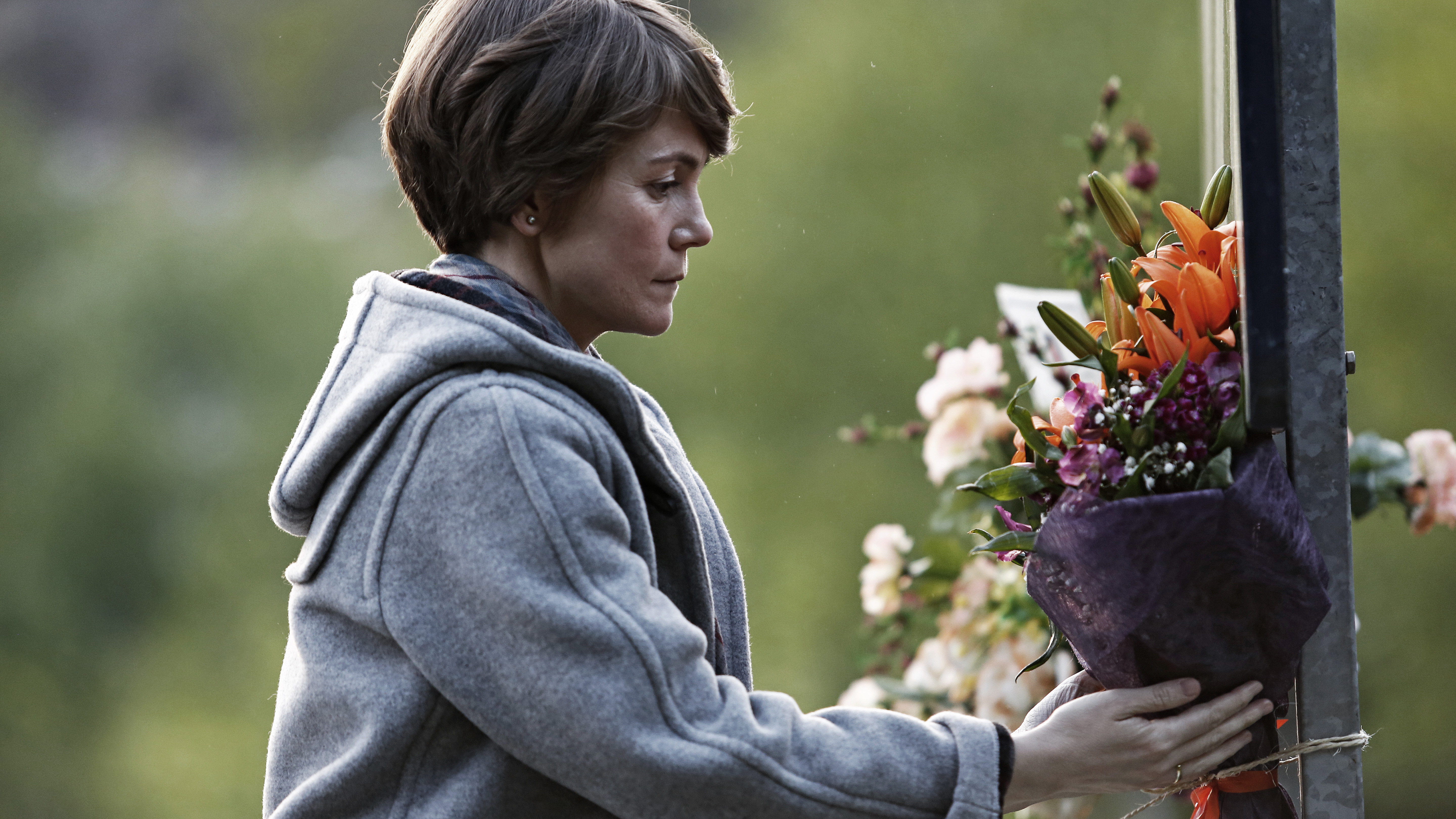 Nagore Aranburu in 'Flowers'
Nagore Aranburu in 'Flowers'
Jose here. Flowers is centered around a mystery which sees construction site office worker Ane (Nagore Aranburu) start receiving flowers from an unknown admirer. Week after week, beautiful flowers arrive on the very same day, then one day they stop. Is it a coincidence that they stopped right after Ane's construction site co-worker Beñat (Josean Bengoetxea) passed away in a car crash? We soon meet Beñat's widow Lourdes (Itziar Ituño) and her mother in law Tere (Itziar Aizpuru) whose relationship only seems to weaken in the aftermath of Beñat's death. Flowers is beautifully constructed by José Mari Goenaga and Jon Garaño (who co-wrote and co-directed the film) who know how to take audience members along on a journey and understand how important it is to have us participate in trying to solve the mystery.
Meditative and melancholic, Flowers, is a worthy follow-up to their equally beautiful For 80 Days, and has been chosen as Spain's official Oscar submission for the Best Foreign Language Film category, a historic achievement since it's the first Basque film chosen for the honor. Individually Goenaga and Garaño have done it all, from animated films to documentaries, but their work together has a truly haunting quality, not to mention exquisite performances. I spoke to the filmmakers to discuss their Oscar hopes, making films in Basque and the movies about women that inspire them.
JOSE: When I first reached out to you, Flowers didn’t have a US release date, now it’s opening on Friday. Are you excited about that?
JOSE MARI: We’re a little bit nervous, the film opens in NYC on October 30 and on November 27th it opens in Los Angeles, which is part of our press agents’ strategy to capture the attention of AMPAS voters. We’re nervous because we don’t know how people will receive it, and the commercial run will undoubtedly affect how it’s perceived by the Academy.
More on Flowers after the jump.
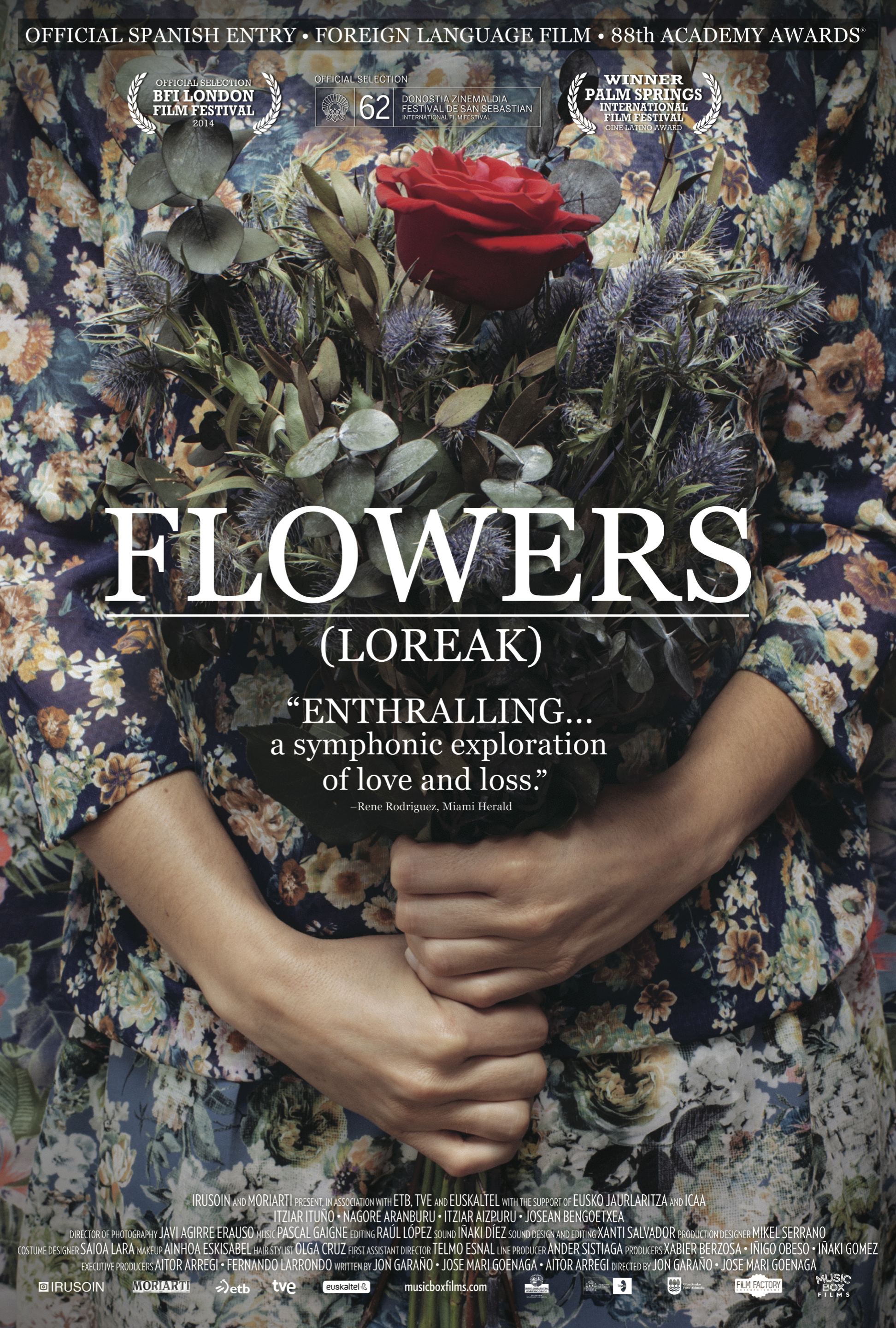 JOSE: Before the film had an official release date in the US, did it being Spain’s official selection for the Oscars, open any other doors in the rest of the world?
JOSE: Before the film had an official release date in the US, did it being Spain’s official selection for the Oscars, open any other doors in the rest of the world?
JON: “Oscar” is a word that excites people, they pay more attention to your film. Thanks to being selected as the official submission other countries have become interested in distributing our film.
JOSE: Now that we got Oscar out of the way, let’s talk about the film!
(They both laugh)
JOSE: I thought the film was quite wonderful and it’s also quite significant that it’s the first Basque film Spain has ever submitted for the Oscars. Basque is the oldest language in Europe and less and less people speak it with each passing year. Is part of your mission as filmmakers who make films in Basque, to help preserve the language?
JON: When we made the film we didn’t really think about it, but it’s true, as anything else done in Basque, making films in our language is important because it might disappear some day. Nowadays Basque coexists with Castilian or Spanish, and where we live half of the population speaks both languages, currently there are 800 thousand people who speak Basque and live in the Basque Country, who knows how many people speak it elsewhere. We shot our film in Basque just because, when we did our first film, For 80 Days, we wanted to do a bilingual movie because that’s how we speak in our daily lives, so we wanted to reflect this in our film, however we couldn’t do it due to distribution. It’s hard to sell a film in two languages so we were asked to pick one, and we chose Basque. In Flowers Basque came out by inertia.
JOSE: The structure of Flowers reminded me of The Hours. Were the film or the book influential at all?
JOSE MARI: I have to confess that I’ve never read the book, but we both love the movie. You never really know what influences you until you see it in your work. We weren’t thinking about the film specifically when we did Flowers, but it must have been there. Recently we were asked by Fotogramas to pick our five favorite films about women and of course we mentioned The Hours. You’re right, our film also has three female characters and the same existential angst.
OK, now you have to tell me the other four films you chose for that list…
JON: So, we had The Hours..
JOSE MARI: All About Eve, Secrets and Lies…we also included Lucrecia Martel’s La ciénaga…
JON: ...and Almodóvar! I wanted to include Volver but José Mari wanted Women on the Verge of a Nervous Breakdown, so we picked that one.
I have absolutely no complaints about that list. Hats off gentlemen. Speaking of great films about women, For 80 Days, also shares several elements with Flowers. Is it easy to get financing for films about women in Spain?
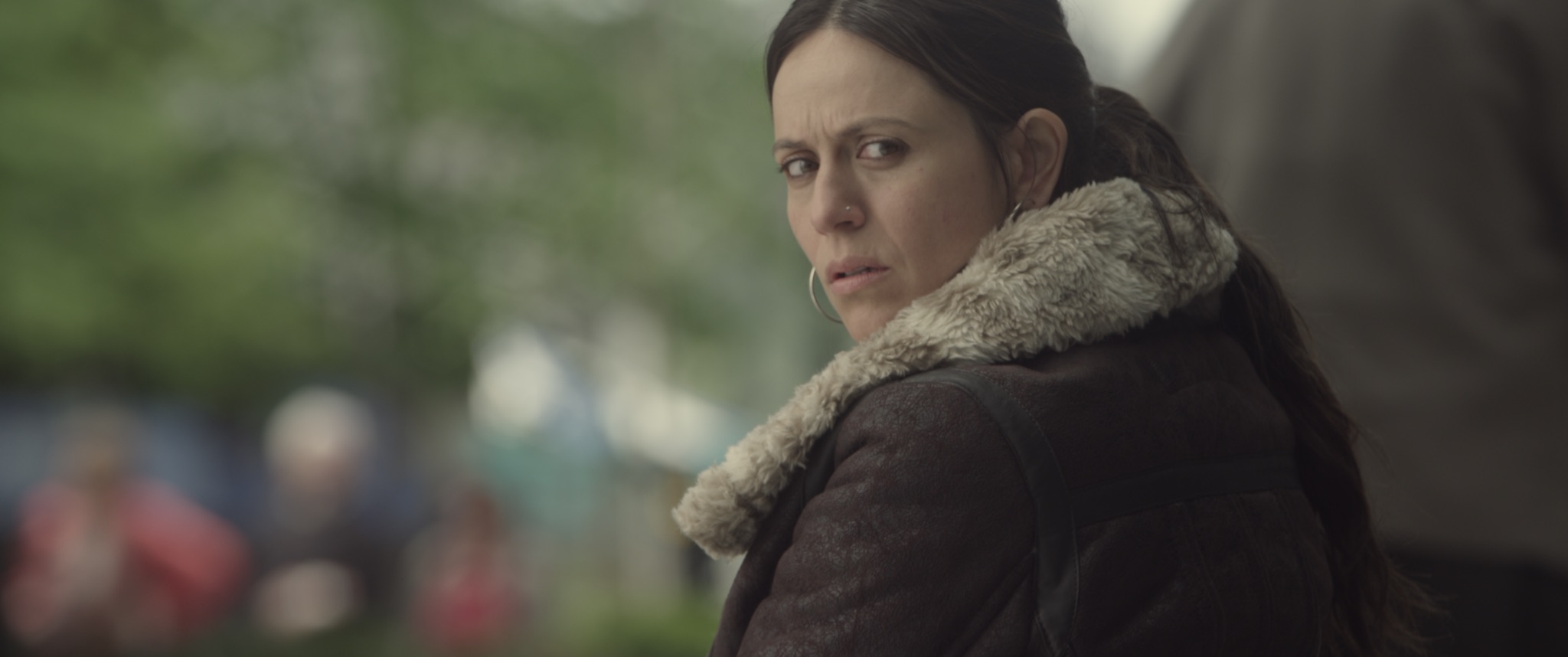 Itziar Ituño in 'Flowers'
Itziar Ituño in 'Flowers'
JON: Part of the reason why we could make Flowers was because our first film was successful, and once you think about For 80 Days, it has many things that make it less than desirable in commercial terms; it’s a film in Basque about elderly gay women, basically everything a producer would tell you not to do.
JOSE MARI: If you take that to a Hollywood studio, producers would pull their hair out. Most financing here comes from television networks, because there is a law that says they have to use six percent of their income to finance films. So films are co-produced by networks and the government. Public networks, which financed our films, also look for elements beyond the commercial, they want positive messages, or that the films reflect society. Private channels are a different story. It’s important for the networks that we have something to contribute to our culture, so making films about women isn’t a handicap.
Flowers is a very tasteful drama, but there are also very subversive thriller elements within it. Were you interested in playing with genre in a more subtle way?
JOSE MARI: Yes, the idea of combining drama with mystery and suspense was there from the start. Many people are surprised when we tell them one of our references to make the film was Hitchcock. We wanted to dosify the information we gave audience members and leave them wondering what was next, especially because the original idea to make the film came from flowers people leave on roads in the spot where someone has died. Is that common in the US?
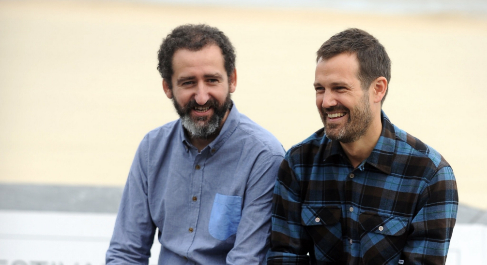 Jon Garaño and José Mari Goenaga
Jon Garaño and José Mari Goenaga
Great question, to be honest I don’t know. It’s a very common practice in Latin America where I grew up, and they usually take it to the next level, by either leaving a statue of Jesus or the Virgin Mary and sometimes a picture of the person who died. Those always gave me nightmares as a kid…
JOSE MARI: (Laughs) I know it’s also common in France and other European countries. Anyway, we asked ourselves what was the drama or tragedy behind those flowers, it was also a mystery because you don’t usually see the person who leaves the flowers.
This is your second film working together as co-writers and co-directors. How does that work out? Do you guys divide tasks, characters, lines?
JON: We don’t write together, when we did For 80 Days, one of us wrote the script, then the other read it and we discussed it to make changes. We took turns. In Flowers we also wrote the screenplay with Aitor Arregi, and we did the same thing. José Mari wrote the first draft of Flowers, and the structure and idea were there from the start, which made the process easy. When we direct we work on everything together during pre-production, but when we shoot I work with the crew and José Mari works with the actors. It makes for a slower process but it helps us feel less pressure, we’ve also directed individual projects and it’s so different.
JOSE MARI: Sometimes you’re convinced something is working great, and then it takes your co-director to point out you’re wrong. It’s really interesting because it challenges you, and forces you to either try to convince him he’s wrong, or reach a compromise. This way of working means there’s very little room for improvisation with the actors, we rehearse everything, but improvisation would slow down the shoot.
Flowers feels like a very tight film, but it’s never oppressive, and a lot of it is owed to Pascal Gaigne’s score. How did you tell him what kind of music you needed?
JON: We’ve been working with him since we began, we all live in San Sebastián and we knew him because he’s worked with some very famous directors like Victor Erice, so we asked him to make the music for our first short film, he said yes and so far he’s worked on everything else we’ve done. We know each other so well that everything works out smoothly. We knew we needed the music in Flowers to take a drastic change, the first half of the movie has an ambient score, some people don’t even notice there’s music in it, and as we reach the end, the music swells and matches the characters’ emotions.
JOSE MARI: The film could’ve easily gotten out of our hands and we could have ended up with something very corny, so Pascal’s music helped us maintain the tone we needed. We also wanted to take advantage of silences, and Pascal uses them beautifully.
JON: Pascal once told me that when it comes to music in films, the music you use is as important as the music you don’t use.
The work by the three lead actresses is fantastic, how did you cast them?
JOSE MARI: Itziar Aizpuru, who plays Tere, was the lead actress in our previous film and we loved working with her. It’s also important to note that it’s not easy finding actors of a certain age who speak Basque, because the language was banned during Franco’s dictatorship, which is why there’s been an effort to preserve the language since 1975. But it’s not common to find actors over 65 who speak Basque. We wrote Tere with Itziar in mind.
JON: Nagore Aranburu, who plays Ane, was also who we had in mind, we brought her in for an audition and she proved us right. Nagore is very well known because she also writes and directs television, so she did a great work in studying the character, working with her was so easy, she usually got it right in the first or second take.
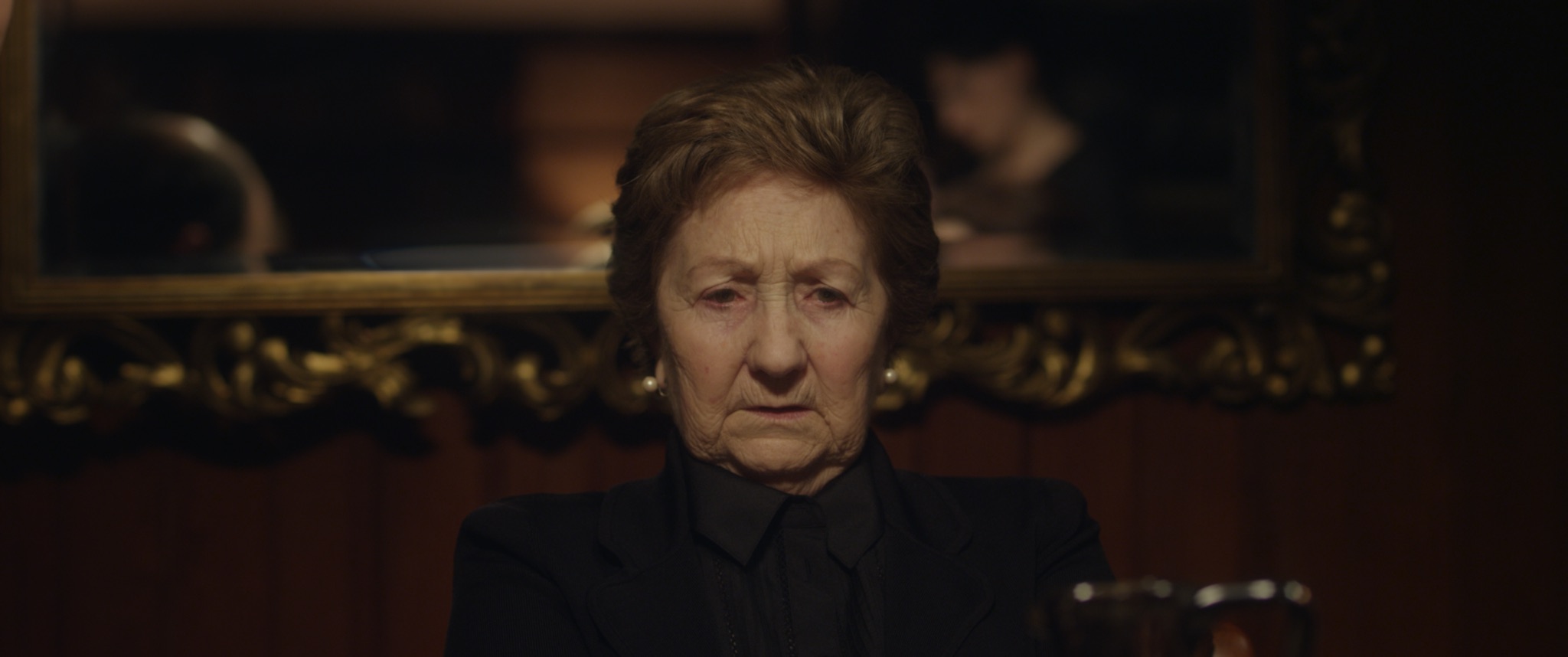 Itziar Aizpuru in 'Flowers'
Itziar Aizpuru in 'Flowers'
Nagore reminds me so much of Giulietta Massina.
JOSE MARI: Yes, in London they introduced us to a word that describes her: stillness. How in front of a camera, all she needs is to move her eyes to unleash a torrent of emotion.
What about casting Itziar Ituño as Lourdes?
JOSE MARI: Lourdes, in a way becomes the film’s true protagonist, due to her dramatic arc, so while we knew her path, we didn’t know her context. We thought about casting an older actress, so we auditioned within a very wide age range, originally Lourdes was an older woman living with a younger partner, but once we cast Josean Bengoetxea as her husband, we lost that angle. We loved Itziar Ituño’s audition, so we cast her as Lourdes, developing her character forced us to be very creative, and we often added elements to her character during rehearsal.
I tend to be a very masochistic cinephile and love being tortured by cryptic films with open endings or unsolved mysteries. As writers, was it important for you to figure out everything about the characters? Or are you team masochism like me?
JON: Team masochism! For instance Beñat is a character who becomes more alive when he dies, when he’s alive we see him operating a crane at work and that’s it, but once he dies we realize he was a different man to each person who crossed paths with him. We find that interesting because the audience then will never really find out what Beñat was like. He’s a complete mystery. Not even we know everything about him.
JOSE MARI: When we were writing the screenplay we wanted to make it even more mysterious. Going back to Hitchcock, the flowers in the film are our MacGuffin, they are a blank canvas for audience members to paint with their fears, hopes, frustration...they will be something different for everyone.

Flowers opens in theaters on October 30.